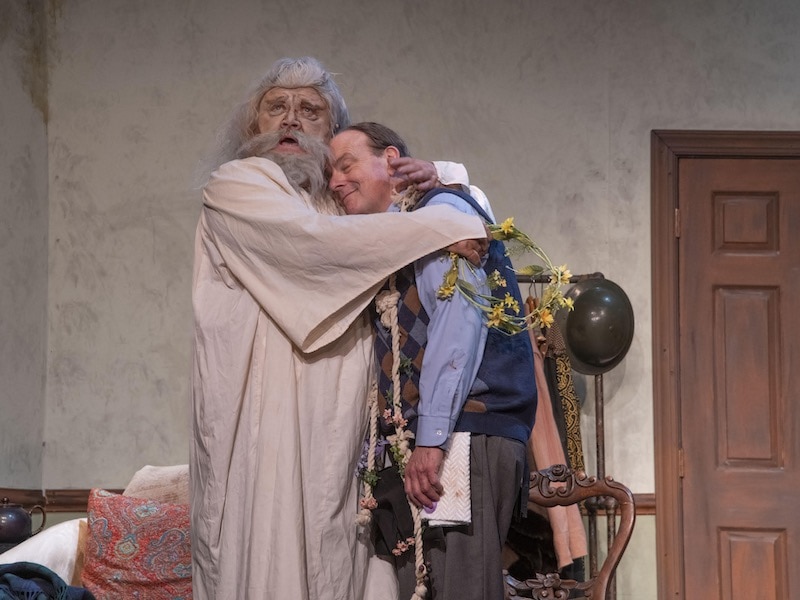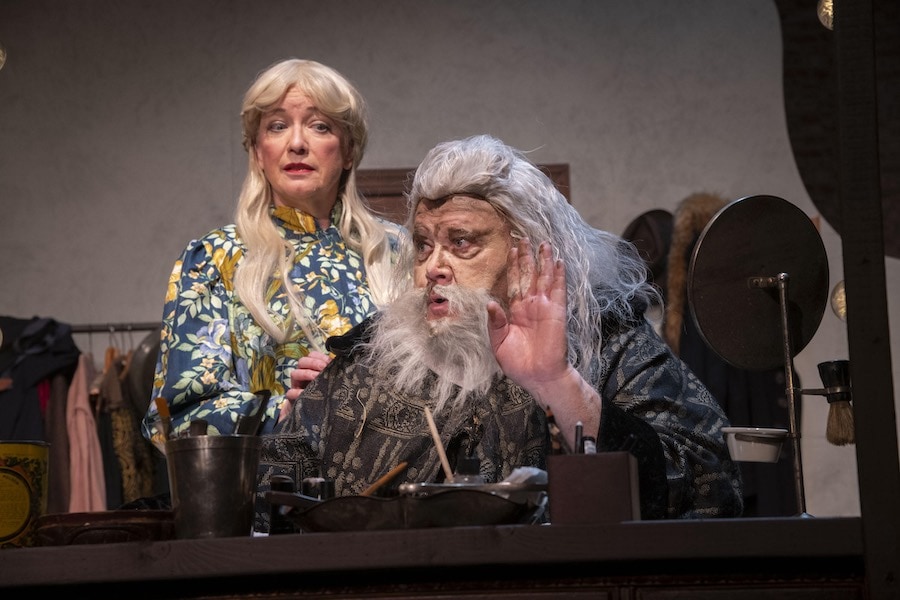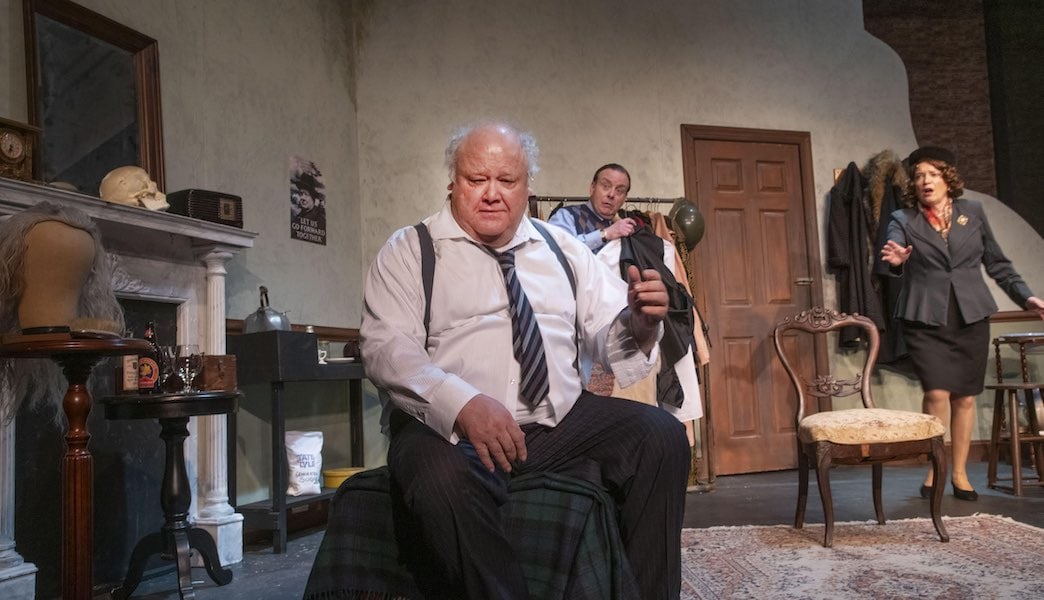The British Players’ The Dresser is an excellent production of a rich, complex, and somewhat perplexing play.
Written in 1980 by Ronald Harwood, the play is a detailed character study of two flawed men and their longstanding relationship. It grew from the author’s experience as personal assistant to Sir Donald Wolfit, one of a long tradition of actor-managers who brought the Bard to the English provinces in the 19th and 20th centuries.

The show is set in a small-town theater in 1942. It begins with Norman, the dresser (Roger Stone), telling Her Ladyship (Janet Replogle) that her husband, Sir, the manager and star actor of their little troupe, has had an alarming public mental breakdown. As they are worrying about having to cancel the evening’s performance, Sir (Equity actor Robert Leembruggen) arrives, having discharged himself from the hospital. His grandiose sense of self-importance is both comic and pitiful, since there are strong indications that he is not the theatrical titan he believes himself to be. Norman at one point says, “There was a queue at the box office this afternoon, if four elderly spinsters constitute a queue,” and Her Ladyship, who seems to have a much clearer grasp on reality than her husband, says, “Who really cares whether he acts or not?” And later, it is revealed that the titles “Sir” and “Her Ladyship” are lies, because he was never knighted, although his arch-rival was.
And yet, Sir plows on, alternately bewailing how he hasn’t the strength to go on and claiming, “I have to carry the world tonight, the whole bloody universe,” and taking great offense at the idea that he is driving himself to exhaustion, insisting instead that he is “driven, driven, driven!” Meanwhile, Norman cajoles him like a child to get his makeup on and feeds him lines he can’t remember, while the rest of the company keep advising him to quit.
The play is set during the Blitz, and as the program note puts it, “As the war rages on outside, the drama within the becomes equally intense.” But it actually seems that the drama strangely is far more intense; the war hardly touches these people’s thoughts, except in how it inconveniences them. Sirens wail, bombs crash nearby, but the characters are in their own little world, unaffected. Sir takes it as a personal insult that the Nazis bombed the Grand Theatre, Plymouth, where he made his acting debut — never mind that they destroyed most of the rest of the city as well. He points out peevishly, “Herr Hitler has made it very difficult for Shakespearean companies.” He also calls the doctor who tried to keep him at the hospital “Il Duce in a white coat.” Her Ladyship comments, “Civilians never understand” — by which she means not the victims of bombs but non-theater people. Norman, too, mentions how two actors have left the company, “in one fell blitzkrieg if you pardon the expression.” These quips play as comic, but they are also a kind of condemnation. These people are all waging their own war, which they consider much more important than the one outside in which people are actually dying. When Her Ladyship asks, “Will the Nazis overrun England? One Lear more or less in the world won’t make any difference,” Norman replies, “Sir always believes it will.”

There is an air-raid siren before the curtain rises on King Lear, but the show must apparently go on. Norman, forced to make the curtain speech, asks, “Will those who want to live — will those who want to leave do so as quietly as possible.” And yet there is real tragedy in the interstices — off-hand mentions of blood-stained bandages, and bomb craters, and a wounded soldier. Norman, when he finally gets fed up with Sir’s whining, almost gets it: “The whole world struggles for bloody survival, so why can’t you?”
But such moments of clarity never last long, as everyone is drawn back into Sir’s drama. The other male characters barely appear: there is Geoffrey/Fool (Louis Pangaro), obsequious to a fault; Oxenby/Edmund (Colin Davies), who grumpily represents that next generation but ends up doing as he is told anyway; and Kent/Gentleman (Noah Eisengrein) and Gloucester/Albany (John Allnutt), who simply appear on stage during Lear. These are all very capable actors, but they have almost nothing to do.
As for the women, for better or worse, the play views them through the lens of its era. They are all, in one way or another, in love with Sir, who treats them like props to be carried around on stage, or props to his ego. Her Ladyship and Irene (Katie Barnett) are two versions of the same character — the actress earning parts on the casting couch — at different ages. Barnett handles well the difficult job of playing Irene throwing herself at Sir, convinced she’ll be the next Cordelia. Norman then (while threatening to slap her) brutally tells her that Sir only likes her because she weighs less than Her Ladyship. “It’s not youth or talent or star quality he’s after, ducky, but a moderate eater.” Janet Replogle hones a fine edge of steel to the exhausted, clear-eyed, disillusioned Her Ladyship, the one of all the company who seems closest to reality. And Nicola Willis-Jones gives a no-nonsense performance as Madge, the stage manager who has been with Sir longer than anyone else and holds a gruff affection for him.
Hugely flawed, complex, larger-than-life characters are red meat to actors, and as Norman and Sir, Stone and Leembruggen make a feast of their parts. The characters are rich, the monologues juicy, and both actors deserve Michelin stars. Stone’s Norman rings the changes from obsequious to nannying to vicious to bewildered to disappointed, all through extended, chatty monologues that seem to have hidden depths below their relentlessly cheerful surface. Leembruggen perfectly captures Sir’s over-the-top, orotund delivery. He ricochets from imperious to plaintive to self-pitying to lecherous to dismissive at breakneck speed, all the while maintaining a dizzying level of larger-than-life, self-important grandeur. He not only plays Shakespeare’s great tragic heroes, he sees himself as a great Shakespearean tragic hero, but unlike a true tragic hero, he never has a cathartic moment of self-realization.

The perplexing question that hovers over the entire play is, why is everyone devoted to this narcissistic blowhard? He certainly possesses charm that he can turn on when he wants to, but that seems hardly enough for multiple people to dedicate their lives to him. He seems to have talent, but how much remains an open question. Perhaps it is an example of how narcissists with hugely exaggerated opinions of themselves and an unquenchable need for admiration will always attract acolytes through sheer magnetism of personality. It is certainly a phenomenon we are witnessing in our own time.
The technical aspects of the production support the acting well. The set, by Robert Coia, Robert Leembruggen, and Mike Lewis, is graceful and effective, with a swooping partial wall between the dressing room and the stage. The costume design, by Jennifer Crier Johnson, is appropriate, especially in Her Ladyship’s 1940s outfits, Norman’s nebbishy argyle vest, and the costumes for Lear. Matt Mills’ sound design worked well, except for the pre-show announcement, which was so distorted as to be unintelligible. Particularly effective was the use of projections — probably also the purview of Mills as technical director; they were color-matched well enough to be indistinguishable from the brick wall next to them, until the scene changed to the stage curtain.
Director Chrish Kresge kept the pace up and brought out the best in the actors. For such a text-heavy show, the delivery was nearly flawless for an opening night. One thing that didn’t ring quite true, however, was the mention in the director’s note that the play should evoke “the enduring power of theater and the relationships that develop among those who create it … that art, in all its forms, can be a source of solace, purpose, and connection, even in the darkest of times.” That is a lovely sentiment, and could well be true, but it does not seem to be what this play is about. The Dresser presents how the monomania of one overwhelming personality can sweep all before him, influencing others to subsume themselves to him and fight among themselves. These force majeure actor-managers considered it their divine mission to bring Shakespeare to the English people, yes, and made an indelible mark on British culture in the process. But at the same time, given the backdrop of a war for Britain’s very survival, Sir’s and Norman’s lives seem to be, to quote the unmentionable Scottish play, “a tale … full of sound and fury, Signifying nothing.”
And that is the true tragedy of The Dresser.
Running Time: Two hours and 15 minutes, including a 15-minute intermission.
The Dresser plays through March 23, 2024 (Fridays and Saturdays at 8:00 pm, and Saturdays and Sundays at 2:30 pm), presented by the British Players performing at Kensington Town Hall, 3710 Mitchell St, Kensington, MD. Purchase tickets ($28 adult, $15 child) online or by email to [email protected].
COVID Safety: Masks are encouraged but optional.
The Dresser
by Ronald Harwood
Norman – Roger Stone
Sir – Robert Leembruggen
Her Ladyship – Janet Replogle
Madge – Nicola Willis-Jones
Irene – Katie Barnett
Oxenby/Edmund – Colin Davies
Geoffrey Thornton/Fool – Louis Pangaro
Gloucester/Albany – John Allnutt
Kent/Gentleman – Noah Eisengrein
Director – Chrish Kresge
Producer – Caroline Gelb
Stage Manager – Lee Zahnow




